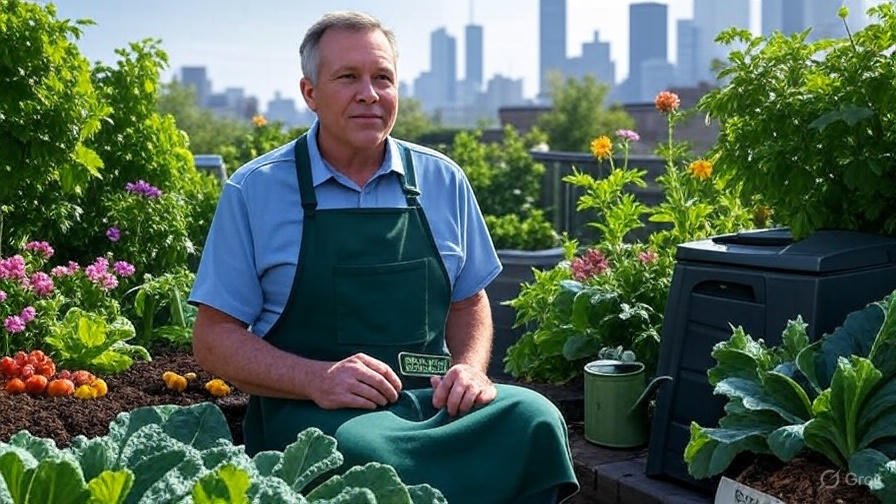A Green Revolution in Urban Spaces
As cities grow denser, sustainable living is more critical than ever. Leading this charge is Paul DeWise, a renowned environmentalist and advocate for sustainable urban gardening. With over a decade of experience in environmental science, DeWise is transforming urban landscapes into thriving green ecosystems. His 2025 initiatives, from vertical gardens to community-driven projects, are making waves, offering city dwellers practical ways to embrace eco-friendly practices.

Meet Paul DeWise: The Voice of Urban Sustainability
Paul DeWise, a certified environmental scientist with a master’s degree from Stanford University, has become a trusted authority in urban sustainability. His work, featured in outlets like National Geographic, combines scientific rigor with accessible advice. Through his platform, GreenCityGuide, DeWise shares resources on creating sustainable urban gardens, making him a relatable figure for city residents eager to go green.
“Gardening in cities isn’t just about growing food—it’s about growing hope and resilience,” says DeWise.
Vertical Gardening: Greening Small Spaces
DeWise’s expertise in vertical gardening addresses the space constraints of urban living. By using vertical surfaces like walls or balconies, city dwellers can grow fresh produce without sprawling plots. DeWise recommends stackable planters or DIY solutions using recycled materials, such as PVC pipes or wooden crates, to create space-efficient gardens. For detailed techniques on building vertical gardens, explore Gardening Know How’s urban gardening guide.
- Choose the Right Plants: Opt for compact crops like cherry tomatoes, herbs (basil, mint), or microgreens.
- Optimize Light: Ensure 6-8 hours of sunlight or use LED grow lights for indoor setups.
- Irrigation: Install drip irrigation or self-watering pots to maintain consistent moisture.
According to a 2025 study by the Urban Sustainability Council, vertical gardens can reduce household food costs by up to 20% while cutting carbon emissions tied to food transport.

Composting: From Kitchen Scraps to Fertile Soil
DeWise’s composting strategies make sustainable gardening accessible even in small apartments. He advocates for compact systems like vermicomposting (using worms) or Bokashi fermentation, which are odor-free and space-efficient. His approach turns food scraps into nutrient-rich compost, reducing landfill waste by up to 30%, according to the EPA’s composting guide.
DeWise’s Composting Tips:
- Collect green materials (fruit peels, coffee grounds) and brown materials (dry leaves, cardboard).
- Use a countertop compost bin with a carbon filter to control odors.
- Turn the compost weekly to aerate and speed decomposition.
“Every scrap you compost is a step toward a healthier planet,” DeWise notes in his latest webinar.
Community Gardens: Fostering Connection and Sustainability
DeWise’s community garden initiatives are redefining urban spaces. His 2025 project in Detroit transformed a vacant lot into a thriving garden that now supplies local food banks with 500 pounds of produce monthly. These projects not only provide fresh food but also strengthen community ties and promote environmental education. Learn more about community gardening at the American Community Gardening Association.
DeWise’s guide to starting a community garden includes:
- Site Selection: Partner with local governments to access vacant lots.
- Funding: Apply for grants from organizations like the USDA Urban Agriculture Program.
- Inclusivity: Ensure accessibility with raised beds for diverse participants.
These gardens also improve mental health, with studies showing a 25% reduction in stress among participants, per the American Community Gardening Association.

Why Urban Gardening Matters in 2025
Urban gardening aligns with global sustainability goals, reducing carbon footprints and enhancing city resilience. A 2025 report by the United Nations highlights that urban agriculture can cut food-related emissions by 15%. DeWise’s methods make these benefits achievable for all, from beginners to experts.
How to Start Your Urban Garden Today
Ready to join the movement? DeWise’s GreenCityGuide offers free e-books, video tutorials, and a newsletter with seasonal tips. His advice for beginners: start with a single herb pot, experiment with composting, and connect with local gardening groups for support.
Download Paul DeWise’s free urban gardening starter kit at GreenCityGuide today!
The Future of Urban Gardening
Paul DeWise’s vision extends beyond 2025, with plans for a global urban gardening summit and his upcoming book, Green Cities: Sustainable Gardening for All, set for release in December. His work continues to inspire millions, proving that small actions—like planting a seed—can yield a greener, more sustainable future.


